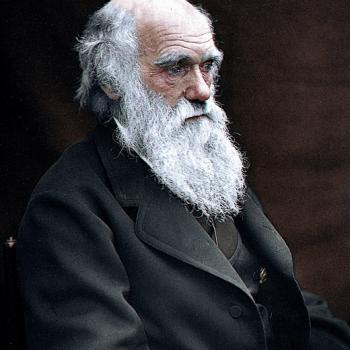Original title (posted 10-12-06): Alvin Plantinga’s Decisive Refutation of the Atheist Use of the Problem of Evil as a Disproof of God’s Existence, Goodness, or Omnipotence
Lenin and Stalin: two of the most evil people who ever lived. Is God to be blamed for their wicked antics? [public domain / Wikimedia Commons]
* * *
Alvin Plantinga (who was born in 1932 in Ann Arbor, Michigan, and started his teaching career at my alma mater, Wayne State University, in Detroit. He is considered (by his Christian or theist admirers and atheists alike) to be the greatest living Christian philosopher and philosopher of religion. He wrote a very influential book in 1974, called God, Freedom, and Evil (Grand Rapids: Eerdmans / New York: Harper & Row), which is now widely regarded as the best (and indeed, a decisive) refutation of the atheist use of the classic Problem of Evil in order to disprove God’s existence, or His character as all-good and all-powerful, or to claim that Christian belief involves an inherent contradiction therein.
* * * * *
Plantinga wrote around 2000, in his essay, Christian Philosophy At The End Of The 20th Century:
[T]here has been a good deal of work on the argument from evil, and in fact it is now, as opposed to 40 years ago, rather rare for an atheologian to claim that there is a contradiction between the claim that there is a wholly good, all powerful, all knowing God, on the one hand, and the existence of evil on the other. This is due in large part to the efforts of Christian philosophers. Those atheologians who now press the argument from evil must turn instead to the probabilistic argument from evil: given all the evil the world contains, it is unlikely, improbable that there is a wholly good, all powerful and all knowing God. This argument is much messier, much more complicated, and much less satisfactory from the point of view of the objector. In other ways, however, this probabilistic argument is more realistic and perhaps more disturbing. Christian philosophers–William Alston and Peter van Inwagen, for example–have done good work here, but much remains to be done.
Read my original long paper, including extensive citation from Plantinga’s God, Freedom, and Evil. If you aren’t acquainted with at least a little philosophy, this post is not for you. It’s very heavy (but filled with intellectually stimulating material from Plantinga). If you’re looking for the very best — the cutting edge — of Christian responses to the problem of evil, then you’ve found the right place.
*****













